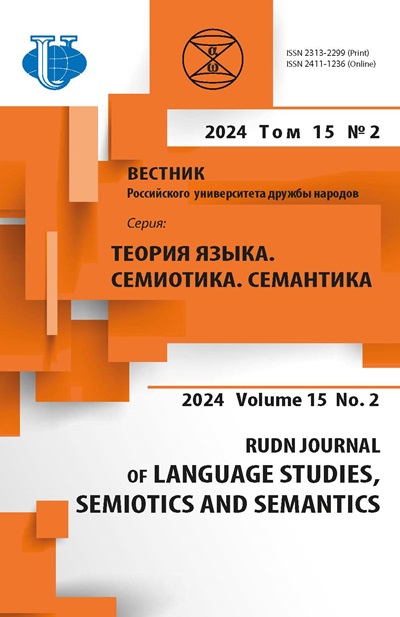The Digital Stratum of a Linguistic Paradigm
- Authors: Zhikulina C.P.1, Perfilieva N.V.1, Li M.1
-
Affiliations:
- RUDN University
- Issue: Vol 15, No 2 (2024)
- Pages: 364-375
- Section: COGNITIVE RESEARCH. PAREMIOLOGY
- URL: https://journals.rudn.ru/semiotics-semantics/article/view/39846
- DOI: https://doi.org/10.22363/2313-2299-2024-15-2-364-375
- EDN: https://elibrary.ru/PNJPNY
Cite item
Full Text
Abstract
The specific of functioning for artificial intelligence and digital stratum is an important direction of interdisciplinary, including linguistics, researches in the modern world. The subject of the study is the voice assistant Alice of the Yandex company with the inbuilt Yandex GPT2 neural network. The object under the study is the AI functioning on the materials of phraseological units and set phrases of the Chinese and Russian languages with the universal semantic component смерть / death. The conceptual category of смерть / death was chosen due to the existence of the Russian and Chinese cultural tradition represented on the rich background ascendant to folklore images. The novelty of the study consists in understanding the notion of “a digital stratum as a separate component of the linguistic paradigm, according to N.I. Tolstoy, and it is introduced and discussed for the first time. In course of linguistic experiment, we managed to reveal four types of generations on the AI stimulus words: 1) the absence of generation; 2) the generation of the existing phraseological units and set phrases of direct and indirect nominations; 3) the hybrid generation; 4) the digital or arbitrary generation. By means of the continuous sampling method there were identified 50 % of the AI generations both in Russian and in translated into Russian materials. The results of the study allow conclude that there takes place of forming the digital stratum of the linguistic paradigm owing to the evolution of the virtual environment of language functioning. With time, textual generations which at present seem to be antilogical, could enter the live conversational style and become widely-used ones due to the mass use of voice systems in various spheres of daily living activities.
About the authors
Christina P. Zhikulina
RUDN University
Author for correspondence.
Email: zhikulina_kp@pfur.ru
ORCID iD: 0000-0003-2488-4616
SPIN-code: 5871-9336
аспирант, ассистент кафедры общего и русского языкознания филологического факультета
Moscow, Russian FederationNatalia V. Perfilieva
RUDN University
Email: perfilyeva_nv@pfur.ru
ORCID iD: 0000-0002-1018-809X
SPIN-code: 5097-4564
Scopus Author ID: 57193135449
ResearcherId: X-8776-2019
кандидат филологических наук, доцент, доцент кафедры общего и русского языкознания филологического факультета
Moscow, Russian FederationMan Li
RUDN University
Email: 1042218157@pfur.ru
Moscow, Russian Federation
References
- Караулов Ю.Н. Машинный фонд русского языка: идеи и суждения. М.: Наука, 1986.
- Ершов А.П. Методологические предпосылки продуктивного диалога с ЭВМ на естественном языке // Вопросы философии. 1981. № 8. С. 109-119.
- Андрющенко В.М. Концепция и архитектура Машинного фонда русского языка // Машинный фонд русского языка: идеи и суждения. М.: Наука, 1986. С. 26-44.
- Вертель В.А., Вертель Е.В., Рогожникова Р.П. К вопросу об автоматизации лексикографических работ (некоторые результаты применения ЭВМ) // Вопросы языкознания. 1978. № 2. С. 104-110.
- Гольдин В.Е. К проекту Диалектологического текстового подфонда Машинного фонда русского языка // Третья всесоюзная конференция по созданию Машинного фонда русского языка: тез. докл. Ч. 2. М., 1989. С. 3-5.
- Раков Г.А. Автоматический словарь народного говора как фрагмент МФ РЯ (состояние и перспективы) // Третья всесоюзная конференция по созданию Машинного фонда русского языка: тез. докл. Ч. 2. М., 1989. С. 11-14.
- Schneider S. Artificial you: AI and the future of your mind. Princeton: Princeton University Press, 2022.
- Напалков А.В., Прагина Л.Л. Мозг человека и искусственный интеллект. М.: Изд-во Моск. ун-та, 1985.
- Орфеев Ю.В. Философские проблемы соотношения мышления человека и возможностей ЭВМ в процессах решения задач: дис. … канд. фил. наук: 09.00.08. М., 1974.
- Рябцева Н.К. Естественный и искусственный интеллект в процессах перевода // А.В. Вдовиченко (ред.) Язык и искусственный интеллект. М.: ЯСК, 2023. С. 237-261. https://doi.org/10.37892/978-5-6049527-2-6-42
- Кибрик А.А. Язык и когнитивная система // I Национальный конгресс по когнитивным исследованиям, искусственному интеллекту и нейроинформатике. Сб. пленарных и индустриальных докладов. Доклады симпозиумов. М.: Общероссийская общественная организация Российская академия естественных наук, 2020. С. 59-61.
- Таулли Т. Основы искусственного интеллекта: нетехническое введение / пер. с англ. СПб.: БХВ-Петербург, 2021.
- Berkeley E.C. Giant Brains, or Machines that Think. New York: Wiley, 1963.
- Turing S., Turing J. Computing Machinery // Alan M. Turing: Centenary Edition. Cambridge: Cambridge University Press, 2012. P. 125-132. https://doi.org/10.1017/CBO9781139105736.017
- Searle J.R. Minds, Brains and Programs // Behavioral and Brain Sciences. 1980. № 3(3). Р. 417-424. https://doi.org/10.1017/S0140525X00005756
- Ушаков Д.Н. Краткое введение в науку о языке. М., 1928.
- Толстой Н.И. Славянская литературно-языковая ситуация // Избранные труды. Т. II. М.: Языки русской культуры, 1998.
- Лисицина Т.А. Образы смерти в русской культуре: лингвистика, поэтика, философия // Альманах «Фигуры Танатоса». Материалы второй международной конференции. СПб.: 1995. C. 54-59.
- Тао М. Трактовка концептов жизни и смерти в китайском философско-культурном контексте // Вестник культуры и искусств. 2020. № 1(61). С. 89-96.
- Pickover A.C. Artificial Intelligence: An Illustrated History: From Medieval Robots to Neural Networks, Alexander Korzhenevski (Ed.). New York: Sterling Publishing Co., 2021.
Supplementary files














